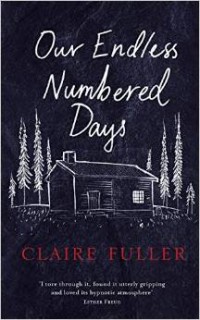You have no items in your cart. Want to get some nice things?
Go shoppingToday we welcome Claire Fuller to the Litro Blog and talk to her about her debut Novel “Our Endless Numbered Days” which will be released on February 26th.
To coincide with the launch we also have an exclusive short story for Litro readers which you can read here.
Book Review: Our Endless Numbered Days by Claire Fuller
In the long hot summer of 1976 eight year old Peggy Hillcoat’s world is still idyllic.
She lives with her German concert pianist mother, Ute, and her survivalist English father, James, in a comfortable London home.
While her mother is remote and unwilling to share her music or even her language with her daughter, her father is committed to introducing Peggy to the eccentric and somewhat disturbing world of survivalists and retreaters.
At first, James’ rigorous schooling of Peggy in such fine arts as skinning rabbits and building fires seems like little more than a great summer adventure, the kind of outdoor thrills and pursuits any child would love.
And so it would remain were it not for a sudden crisis which triggers a crazed response in James and turns this once idyllic life into a nightmare.
While Ute tours Europe James whisks Peggy away to a remote mountain hut, ‘die Hütte’, deep in the German mountains, and explains to her that some terrible apocalyptic event has brought about the end of the world.
They are now the last remaining people on earth and must depend on their skills to survive.
The story is narrated in flashback from the perspective of the now 17 year old Peggy. She has returned to her old home in London and is recounting her lost years spent in the wilds with her increasingly deranged father.
Although we know the outcome of events, the horror of what unfolds in ‘die Hütte’ is not diminished in any way as a result.
The clear narrative voice of Peggy in particular works very well – her childish naiveté and unquestioning acceptance of her father’s authority and expertise allow us, as readers, to trust in him too and to follow his lead, even though we know he is lying, even as we see he is becoming increasingly unhinged.
The vivid descriptions of the landscape and the accurate depictions of the, at times rather gruesome, realities of surviving in the wild, particularly during winter, help create an atmosphere that is as claustrophobic as it is exhilarating.
Particularly poignant is the silent piano which James builds for Peggy during their first summer and which he teaches her to play, fulfilling a role which Ute could never provide.
The silent music is a haunting expression of their continued love not just for Ute but for a time in their lives which was more beautiful, more idyllic than the lives they now lead deep in the mountains.
But in the end, even the civilizing power of music cannot protect James and Peggy from the brutality of existence in such an inhospitable environment, and life in the wilds proves too much for them.
While James’ descent into madness is apparent, Peggy’s retreat from reality is more subtle and more painful and the horror of the revelations as they unfold towards the end of the book make for painful reading.
This is an astonishing debut. A beautifully crafted and intriguing story.
Our Endless Numbered Days is released on February 26th and is published by Fig Tree Penguin
Interview with Claire Fuller

Jen: Our Endless Numbered Days was inspired by the true life story of Robin van Helsum, a Dutch boy who walked out of a German forest in 2011 claiming to have survived there with his father. What was it about this story that captured your imagination and how did it result in Our Endless Numbered Days?
Claire: I’ve always been interested in stories about extreme survival. Just like my narrator Peggy, when I was eight I was allowed to stay up late to watch the original Survivors television series, and the idea of living in a world with few other humans stuck with me. Another thing that has always fascinated me is feral children, or those brought up without civilizing influences. How affected would a person who had that experience be, and in what way?
After reading about Robin van Helsum in the newspapers I started writing Our Endless Numbered Days as a screenplay for a module I was studying for my masters at the University of Winchester. This began with Peggy in the forest, but I soon realised that I needed to understand how she had come to be there, and when the module finished I rewrote my two scenes into prose and continued from there.
Jen: The original title was The Great Divide, why did you opt for Our Endless Numbered Days?
Claire: Actually, there were a lot of titles before The Great Divide. I kept a list on my phone and would add to it whenever a new one came to me. Our Endless Numbered Days could also have been called The Wald-junge, The girl who cried wolf or The Briar Rose. So, The Great Divide was always a working title.
Our Endless Numbered Days is the name of an Iron and Wine album, and I listened to it, and all other albums by Sam Beam as I wrote. Although that’s where the title came from, it is very relevant to what happens in the novel – Peggy and James stop keeping a calendar, but at the same time the reader knows their ‘days are numbered’.
Jen: You’ve mentioned (in a conversation on Twitter) that you sometimes write short stories as a way of developing plotlines or characters in a book. Did you do this with Our Endless Numbered Days?
Claire: Yes, I did that a lot. It also helped me when I was a bit stuck for what needed to happen next. I’m in an online group called Friday Fictioneers and the wonderful Rochelle Wisoff-fields posts a picture every Wednesday (yes, I know, it should be Friday), and about 100 people around the world write a 100-word story inspired by the picture. It’s a great jumping-off point.
Jen: Ute, the mother, is very interesting. We don’t really get to know her too well, and she is a rather guarded character, I would love to find out more about her and how she survived the whole period when Peggy and James were gone. Is that something you would consider?
Claire: I’m glad you found Ute interesting. Some readers have described her as cold, but I wonder if that’s just our view of what we think a mother should be. I sometimes wonder what would happen if Ute’s and James’ roles were reversed and how that would change our perceptions of them as parents. I hadn’t thought about writing about the period when Peggy and James were gone, but I wouldn’t rule it out. Ute does describe a few of the traumatic things she had to face and it might be interesting to look at these more closely.
Jen: I found the use of music in the book as a civilizing force, but also as something which seems to keep Peggy sane, a very accomplished facet of Our Endless Numbered Days. Did you consciously develop this as an idea? Are you musical yourself?
Claire: I can’t play an instrument, but I do listen to a lot of music and when I was younger I sang (rather badly) in a band for a while. The theme of music grew organically as I started out writing this novel, but then, when I became aware of it, I definitely developed it more consciously, and used it in all sorts of ways. As you mention it’s a civilizing force, it’s used to describe both Ute’s and Peggy’s moods, as a connection between Peggy and her brother, and later her mother, and yes, it is certainly used by Peggy to keep herself sane, but ironically on a rather improbable piano.
Jen: The prose in Our Endless Numbered Days is very clear – I heard it described by one reviewer as “translucent” which I think is a perfect description – it gives the story a certain credence, the way Peggy narrates it. Is this a style that comes naturally to you? How easy was it to find and develop this voice and this child’s perspective?
Claire: Thank you. When I was starting to write Our Endless Numbered Days I didn’t think about voice or narration style at all; I just started writing, so to some extent how the novel turned out, is probably just the way I write. But when I was revising the manuscript I was very conscious that Peggy is a young and naïve seventeen when she’s telling this story, and at the beginning she is only eight.
But, there’s also a trick I sometimes use when I’m writing, which might sound a bit odd. If I’m having a day where nothing is coming out right; where my writing sounds like a cheap, poorly written romance novel, I stop and read a bit of Richard Ford. I keep his novel, Wildlife, on the table beside me, but it could equally be Canada, except I have the hardback and it’s big. I read a random page, and sometimes, if I’m lucky that can get me back on track.
Jen: You have written on your blog about the whole process of becoming a published author. Now that it has happened what do you think about it – the whole process of marketing and publicity in particular are you enjoying that?
Claire: I’m very surprised to find myself say that I’m loving it. Previously I co-ran a small marketing agency, so the marketing side is something which comes very naturally to me and I’ve been very keen to get stuck into things like this interview for Litro. But I was much more worried about any public performances I would have to do. The idea of public speaking is frightening and before each event I’ve been very nervous but so far I’ve found that once I’m on stage it’s been ok. And of course it has got easier with each event, and I always have a book to hide behind!
Jen: You’re also an artist and I was struck when reading Our Endless Numbered Days with how vivid the descriptions of the forest and the ‘die Hütte’ were. Do you think being an artist helps with this? I could very clearly see the mountain retreat they escaped to.
Claire: That’s a hard one to answer because I’ve been making art for so long I don’t know what my descriptions would be like if I didn’t! And also, although I do a lot of drawing, I’m not a painter, I’m a sculptor. But, when I write I do ‘see’ the locations, characters and scenes playing out in my mind before I write them down, so perhaps that’s why. A lot of readers have said they felt like they were really there in the forest as they were reading, and that’s a huge compliment.
Jen: The survival strategies used by James and Peggy are also very vivid – skinning squirrels in particular. Are you now an expert wild woman of the forest? ;-)
Claire: Hah! My children say that when the end of the world arrives they’re going to race home from wherever they are because they can be sure that I’ll know how to catch and kill them some food! I’m not so sure though. I know all about it in theory – but many things I describe in the book, I haven’t done in real life – like skinning a squirrel. Though I can now recognise and have collected some of the more obviously edible wild mushrooms – oyster, hedgehog, beefsteak, horn of plenty – so perhaps we could live off mushroom stroganoff, as long as I remember to put a tin of paprika in the cellar with the water purification tablets and penknife!
Jen: What’s next? You’re working on your second novel, how is that progressing?
Claire: It’s going ok so far. I’ve shown it to my agent and I’m working on some revisions, and then we’ll see. It is a very different story, has different characters and a different location although nature is still an important theme.

Many thanks to Claire Fuller for talking the time to talk to us at Litro. Our Endless Numbered Days is published on February 26th by Fig Tree Penguin.




